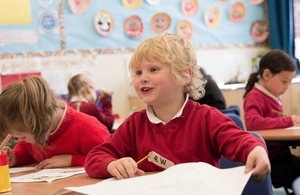Only 50% chance of good secondary education for Swindon children
Only half of secondary pupils in Swindon attend a school or academy that is judged good, Ofsted has found.

Primary school pupil
Following an inspection of Swindon Borough Council’s school improvement arrangements, Ofsted has today (11 March 2015) published its findings.
Inspectors found the council’s school improvement support in schools was disjointed. Not all stakeholders understood their role and responsibilities for helping schools to get better. As a result, pupils’ GCSE attainment was low and thousands of secondary school children were attending schools that were less than good.
Bradley Simmons, Ofsted’s Director for the South West, said:
It is very concerning that children in Swindon only have a 50% chance of going to a good secondary school. This is compounded by the fact that there are no outstanding secondary schools or academies to help to share effective practice across the borough. As a result, nearly 6,000 pupils are attending a secondary school that is not yet good.
Swindon’s primary schools are faring better and the council’s good work with academies and local employers has seen an increase in students completing their education and training, beyond the age of 16.
However, more needs to be done to close the attainment gap for disadvantaged children, both at primary and secondary, as well as ensuring the brightest pupils are supported and challenged to achieve the best GCSE results.
Given the poor performance of the council’s schools and the disjointed school improvement support, Ofsted will carry out a further inspection of the local authority to evaluate its progress in addressing the areas that need urgent improvement.
The inspection took place between 1 and 5 December 2014. The findings were based on discussions with Swindon Borough Council, maintained schools and academies, early years and post-16 education providers, outcomes from the focused inspections of a number of schools and academies, and responses from a telephone survey of schools and academies.
Areas the local authority needs to improve include:
- setting out the roles and responsibilities of different stakeholder groups involved in school improvement, so that they work cohesively together
- increase accountability by implementing the proposed Education Improvement Strategy Board and set out the necessary actions to improve education provision in Swindon, especially for disadvantaged and the most able pupils
- check rigorously the quality and effectiveness of the council’s support to schools so that improvement is more consistent and the proportion of good or outstanding schools exceeds the national average
- ensure that concerns about standards and leadership in academies are referred promptly and directly to the Regional Commissioner for Schools
Notes to editors
- The outcome letter for Swindon Borough Council is online.
- The framework for the inspection of local authority arrangements for supporting school improvement is also online. The aim of local authority school improvement inspection is to assist local authorities in their duty to promote high standards and fulfilment of potential so that all children and young people benefit from at least a good education. The inspection framework acts as a powerful lever for improvement by helping to challenge inconsistencies. It enables Ofsted to report more rigorously on the contribution of local authorities to improving education in England. The inspection is not universal. Ofsted will normally inspect only where concerns about performance are apparent or where requested to do so by the Secretary of State.
- The Office for Standards in Education, Children’s Services and Skills (Ofsted) regulates and inspects to achieve excellence in the care of children and young people, and in education and skills for learners of all ages. It regulates and inspects childcare and children’s social care, and inspects the Children and Family Court Advisory and Support Service (Cafcass), schools, colleges, initial teacher training, work-based learning and skills training, adult and community learning, and education and training in prisons and other secure establishments. It assesses council children’s services, and inspects services for looked after children, safeguarding and child protection.
- Media can contact the Ofsted Press Office through 03000 130 415 or via Ofsted’s enquiry line 0300 123 1231 between 8.30am and 6.00pm, Monday and Friday. Out of these hours, during evenings and weekends, the duty press officer can be reached on 07919 057 359.